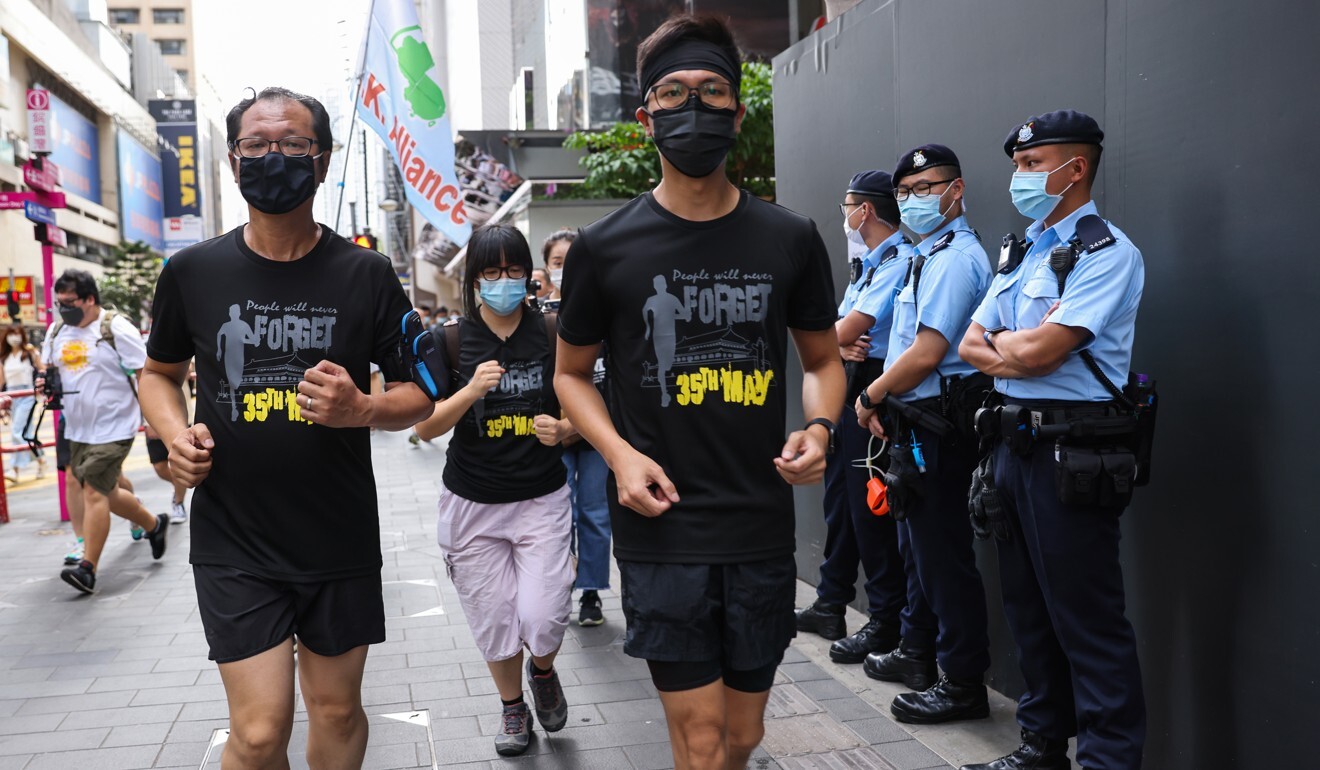There is history, with which historians and historically minded social scientists are concerned. Then there is collective memory, with which a community shares to define its identity, by reference to a historical event, or a series of events, usually tragic. The two should not be confused, and yet we almost always do confuse them.
June 4 – the annual commemoration of the
and its aftermath in Hong Kong, now – is a prime example of such a collective memory for many people in the city. It’s also the subject of sustained historical study. It’s almost inevitable that the history and the collective communal memory of the event conflict at key points. By their very different nature and underlying social processes and formations, they tend to diverge over time.With June 4, sometimes we argue about the history, sometimes the memory, often both. As a result, we often just talk past, and end up shouting at, each other.
June 4 as collective memory
A characteristic of collective or communal memory is that instead of the past haunting the present, it’s really the present projecting its concerns to determine what we remember and how to remember it.
While there were calls for greater democracy in Hong Kong well before 1989, the June 4 crackdown on the mainland really marked the start of a local democratic movement in the city. Henceforth, the June 4 commemoration had been a key social ritual for the democratic camp to educate the public, promote its political agenda and raise donations – in short, to keep the flame alive. It was the founding “myth” of the United Democrats, subsequently the Democratic Party.
As the French-Jewish sociologist Maurice Halbwachs, who died in the Buchenwald concentration camp, understood it, collective memory is ahistorical, even anti-historical. Proper history is always complex and requires mental detachment to examine multiple viewpoints and perspectives. It recognises moral ambiguities, conflicting motives, and unpredictable and unintended outcomes. It’s subject to revisions, challenges and reinterpretations.
Not so with collective memory. It is always black and white, good vs evil, without ambiguities and complexities. It is moral clarity par excellence. There is a single sacrosanct narrative, which cannot be challenged. As a result, many Hong Kong people understand June 4, and the Chinese communist rulership, in the same unchanging way today as they did in 1989. Needless to say, China, the communist state and the Communist Party are vastly different today from what they were more than three decades ago.
However, collective memory has no sense of the passage of time. The event it remembers is eternally fixed, and its meaning and lesson already learned once and for all times, and must be taught in the same way forever. It’s an expression that defines an eternal truth, an essential identity for many Hong Kong people. That’s part of the essential memory that keeps the city and its people apart – and ideologically and culturally distinct – from the mainland and mainlanders. And it must be renewed and reaffirmed year after year. Any changes, challenges or revisions are falsification, censorship and lies.
Unlike Hong Kong, though, Beijing has always had an ambiguous attitude towards the annual event and tolerated it for so long. June 4 protesters could be considered patriots as they at least accepted the legitimacy of the 1997 handover. Until recently, no one questioned whether Hong Kong was an integral part of the nation, whatever its system of government.
The annual protest organisers, the Hong Kong Alliance in Support of Patriotic Democratic Movements of China, were branded “subversive” by Beijing, yet as the name implies, the movement considered itself patriotic. Not only the pan-democratic organisers, but also to a great extent the participants, identified themselves as Chinese who happened to oppose one-party communist dictatorship and demanded democracy in both the city and the mainland.
Still, even though Hong Kong people consider themselves Chinese, they are a different kind of Chinese. Over time, though, it’s not hard to see how with the rise of localism, some people, especially younger ones, no longer consider – or as we say today, self-identify – themselves as Chinese or that Hong Kong is part of China. Hong Kong people are different from Chinese, period. It was logically and ideologically consistent that almost all the major university student unions, inspired by localist politics, formally declined to take part in the June 4 commemoration in the past decade. So far as they are concerned, China is just another country that ought not concern them, except as a foreign occupation force.
June 4 as history proper
As history, June 4 is of course incredibly complex. The word massacre does not even scratch the surface, let alone being the be-all and end-all narrative favoured by many in Hong Kong and others in Western countries. There has been no greater failure of Western understanding, analysis and prediction – let’s call them collectively as Western sinology – than how most Western analysts and politicians, bar a few exceptionally insightful ones, have come to talk about June 4.
The key to understanding the West’s misunderstanding, which continues to this day, is the year in which it happened. On June 4, 1989, while Chinese tanks were rolling into Tiananmen Square, Poland held its first parliamentary elections after the ruling Communist Party relinquished its monopoly on power and on forming political parties, less than two months before.
In the same year, the Berlin Wall fell. Thereafter, in rapid succession, one after another, Soviet satellite states declared independence. At the end of 1991, the Soviet Union was formally dissolved. For the great Marxist historian Eric Hobsbawm, that marked the end of the 20th century; that’s why he called it “the short century”, as opposed to “the long century” of the 19th, which ran until the outbreak of the first world war.
But Hobsbawm’s is a completely Eurocentric perspective; so is the almost uniform Western consensus that emerged after June 4, 1989, according to which Chinese communism was on its last legs. Both were marked decisively by the West’s encounter with Soviet communism, the 1917 revolution and the Cold War. So of course, after 1989, if you were a Westerner and/or a democrat, surveying the latest development of worldwide communism, that would be your natural and firm conclusion, too.
But Chinese “communism” was and was not part of worldwide communism. The internal logic of its development, especially after 1978, has a lot more to do with the socio-economic conditions specific to modern Asia and the political development of China that dates back to historical times.
Just as mathematicians distinguish algebra as the science of the discrete and calculus as that of the continuous, so historians forever argue whether key historical events were decisive breaks and revolutions or continuous from previous developments.
For Hong Kong people and most of the rest of the world, there is no doubt Tiananmen marked a decisive, singular event; for those who discovered the democratic struggle in the city, it was indeed a transcendent moment. Thereafter, Hong Kong democracy became a powerful political movement. It was progressively institutionalised in expanding the electoral franchise, and winning more and more seats in the district and legislative councils, a process begun by the departing colonial Brits and continued after the 1997 handover.
Tiananmen was very different, though, for Deng Xiaoping and his communist followers. For Deng, it was undeniably a big disruption, but still, no more than a bump on the road to China’s economic reform that was started in 1978. In any case, the event never actually had the same impact on the rest of the country as it did on Hong Kong and the West. While this is usually interpreted as communist brainwashing, censorship and propaganda by the Western press, the Sinophile Martin Jacques observed that its impact should not be exaggerated outside of some major mainland cities for another reason.
The traumatic events in Tiananmen Square in 1989 [...] had surprisingly little impact, beyond a point, on the country as a whole
“Something major can happen in one part of the country and yet it will have little or no effect elsewhere, or on China as a whole,” he wrote in When China Rules the World. “The traumatic events in Tiananmen Square in 1989, for example, although finding expression in many cities, had surprisingly little impact, beyond a point, on the country as a whole.”
While Westerners tend to think of freedom politically, in terms of democracy, the historical Chinese experience with freedom has been about the cycles of centralisation and decentralisation by the capital. Quite simply, given China’s vast geographic expanse, there is always an inherent limit to how far the central government can monopolise or centralise power.
Deng’s economic reforms ultimately mean decentralising control to the provinces, especially the rich ones in the southern coastal areas. In the end, economic reforms offer far greater personal freedoms to far greater numbers of Chinese than anything that could have been achieved by the students and workers in 1989.
The current concentration or centralisation of power under Xi Jinping will in turn be followed by periods of relaxation and decentralisation. That has always been the case with China’s historical patterns and recurrent trends, just as democracy has ebbed and flowed throughout Western history.
Conclusions
Should Hong Kong be allowed to continue to commemorate June 4, after the Covid-19 pandemic ends and can no longer be used as an excuse or reason to ban the mass gathering? Absolutely. It may not be communist-friendly, but it is patriotic. And some form of democratic nationalism is perfectly legitimate for Hong Kong people, as opposed to localism and secessionism.
Should June 4 be taught in school? I think so, but how? Some people want to teach it as a lesson in democracy and collective memory, some as objective history, still others as part of China’s rise to a superpower. How do you write a curriculum that would be acceptable to most in the current, politically sensitive climate?
A question often asked before Hong Kong’s return to China in 1997 was whether the candlelit vigil to commemorate victims of the Tiananmen crackdown would be allowed to continue. Now, 24 years later, the issue is being raised again.
The peaceful annual gathering on June 4 usually draws tens of thousands of people to Victoria Park, where they create a sea of flickering candles. It is an impressive sight and a moving memorial to the hundreds, maybe more, killed when China’s military crushed student protests in Beijing on June 4, 1989.
Since 1990, the vigil has provided the strongest evidence that Hong Kong’s freedoms remain intact. It took place every year until the outbreak of Covid-19. But this year’s event, planned for Friday, has been banned for the second year running. The police have again cited the public health threat posed by the pandemic.
Questions are also being asked about whether the vigil would breach the national security law imposed by Beijing in 2020. The event is organised by the Hong Kong Alliance in Support of Patriotic Democratic Movements of China, which has long called for an end to China’s “one party rule”. Some suggest this would constitute subversion.

The last vigil, in 2019, attracted 180,000 people according to organisers. We have not seen gatherings on that scale since the virus struck. But a smaller event could have taken place safely.
While risks from new variants of Covid-19 remain, there were no new cases on Thursday and Friday and only one imported case on Saturday. Performance venues, cinemas and amusement parks can open at 75 per cent capacity. Almost 8,000 football fans attended the climax to the Premier League season at Hong Kong Stadium last weekend.
Government officials have not been prepared to say whether they regard the event as breaching the security law. Chief Executive Carrie Lam Cheng Yuet-ngor said it would depend on what happened at the gathering.
But executive councillor Ronny Tong Ka-wah is right to point out that to commit subversion a person must use “force, threat of force or unlawful means”. If the gathering was permitted and participants acted lawfully, it is difficult to see how their presence could be regarded as subversive.
The vigil has a special place in the hearts of Hong Kong people. The Tiananmen crackdown on students calling for democracy, economic reform and an end to corruption, had a lasting impact on Hong Kong and its relationship with Beijing.
The bloodshed came at a time when the final constitutional arrangements were being put in place for Hong Kong’s return to China. Many people believed the city’s way of life and freedoms would be better protected if the country embraced democracy. Up to a million marched in protest in Hong Kong and the city provided support for the student demonstrators.
Beijing, however, viewed this response as subversive. These developments fuelled mistrust between Hong Kong and the central government and deepened a political divide which continues to exist today.
Protests in the city in 2014 and the civil unrest of 2019 were accompanied by calls for democracy. Beijing’s passing of the national security law, meanwhile, was driven by fears that subversives were working with foreign forces to destabilise Hong Kong. We are still living with the fallout from 1989. But we can only learn from the past if we remember it.
The candlelit vigil has always been orderly. Last year, 20,000 gathered despite the ban. The police, sensibly, adopted a tolerant approach. This did not stop leading participants being later jailed for taking part.
Any who choose to gather on Friday know they will be taking a risk. Many might opt to light a candle at home instead.
The vigil has been the most powerful symbol that Hong Kong’s freedoms remain intact. Permitting it to take place is the best way for Beijing to counter criticism that the city’s free expression is being suppressed. Next year, there may not be a pandemic to worry about. It is to be hoped that the June 4 vigil will then be allowed to return. This poignant act of remembrance and potent symbol of Hong Kong’s freedoms must be allowed to continue.









































SCMP Editorials
Opinion
Harry's View
Letters